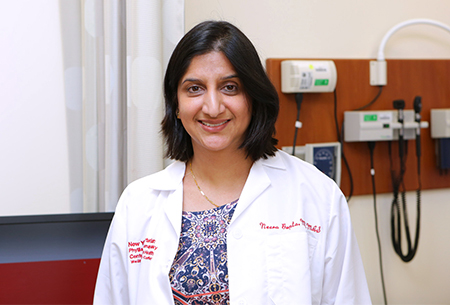Statural growth impairment, both a marker for and complication of poorly controlled Crohn’s disease, occurs in up to 80 percent of patients, more frequently in males than females for unknown reasons. Neera Gupta, MD, MAS, is a physician-scientist and Director of Research, Pediatric Inflammatory Bowel Disease Center, NewYork-Presbyterian Komansky Children’s Hospital at NewYork-Presbyterian/

Dr. Neera Gupta
“Findings from The Growth Study suggest sex-specific molecular pathways lead to statural growth impairment,” says Dr. Gupta. “Our findings highlight the need to develop a sex-specific treatment approach for children with Crohn’s disease, which will represent a major paradigm shift in clinical practice.”
The study examining clinical variables associated with statural growth in children with Crohn’s disease, published in the June 2021 issue of Inflammatory Bowel Diseases, was selected as Editor’s Choice and Leading Off article. The study received a mention on the cover of the journal and is in the top 5 percent of all research outputs scored by Altmetric.
In their most recent publication, Dr. Gupta and her colleagues at nine other medical centers conducted an investigation that examined a range of clinical variables and their association with statural growth by sex for 113 children with Crohn’s disease with a mean chronological age of 12 years. The clinical information collected and analyzed included such variables as:
- Race/ethnicity
- Initial classification of IBD
- Disease location
- Disease behavior
- Patient-reported symptoms and signs at onset
- Reported use of medications
Among 41 female patients, an initial classification of IBD as Crohn’s disease or perianal disease at diagnosis were associated with better growth. However, patient-reported joint pain at symptom onset or the use of probiotics or azathioprine/
Variables associated with statural growth were markedly different for 72 males in the study. Patient-reported poor growth at symptom onset or the use of infliximab, biologics, methotrexate, or vitamin D were associated with better growth. In contrast, an initial classification of IBD as Crohn’s disease or patient-reported anorexia or mouth sores at symptom onset were associated with worse growth.
Dr. Gupta and her colleagues noted that females appear to have better growth independent of their disease severity/
They conclude, “The novel findings in this report support the need for investigating, identifying, developing, and instituting effective sex-specific treatment strategies, an approach that is not currently part of the pediatric Crohn’s disease management algorithm.”



